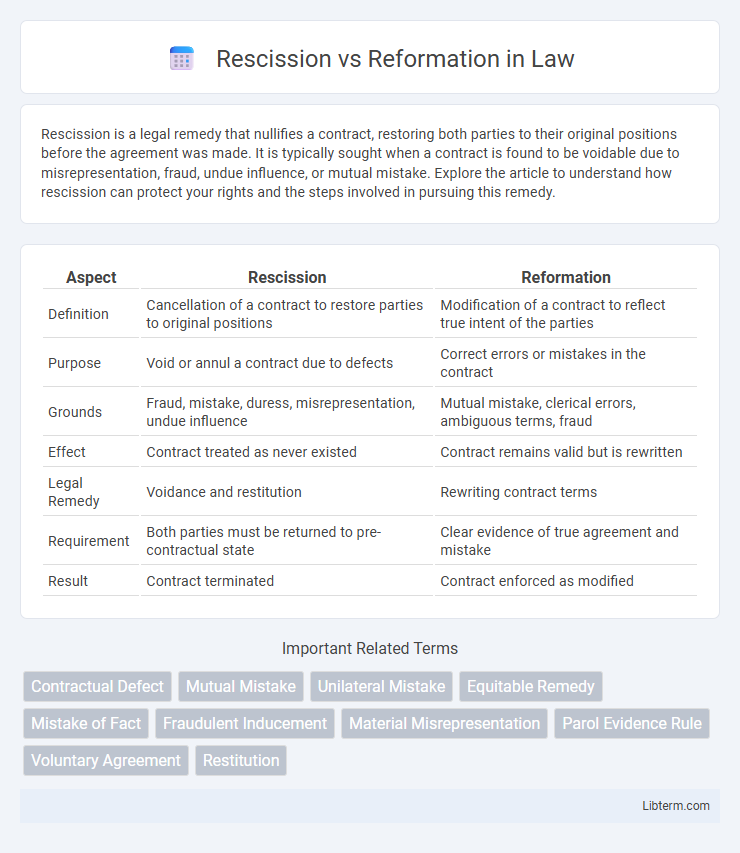Rescission is a legal remedy that nullifies a contract, restoring both parties to their original positions before the agreement was made. It is typically sought when a contract is found to be voidable due to misrepresentation, fraud, undue influence, or mutual mistake. Explore the article to understand how rescission can protect your rights and the steps involved in pursuing this remedy.
Table of Comparison
| Aspect | Rescission | Reformation |
|---|---|---|
| Definition | Cancellation of a contract to restore parties to original positions | Modification of a contract to reflect true intent of the parties |
| Purpose | Void or annul a contract due to defects | Correct errors or mistakes in the contract |
| Grounds | Fraud, mistake, duress, misrepresentation, undue influence | Mutual mistake, clerical errors, ambiguous terms, fraud |
| Effect | Contract treated as never existed | Contract remains valid but is rewritten |
| Legal Remedy | Voidance and restitution | Rewriting contract terms |
| Requirement | Both parties must be returned to pre-contractual state | Clear evidence of true agreement and mistake |
| Result | Contract terminated | Contract enforced as modified |
Understanding Rescission and Reformation
Rescission is a legal remedy that cancels a contract, returning parties to their pre-contractual positions when the agreement is voidable due to factors like fraud, misrepresentation, or mutual mistake. Reformation involves modifying the terms of a contract to reflect the true intent of the parties when the original document contains errors due to fraud or mutual mistake. Both remedies address contract defects but differ in outcome: rescission voids the contract, while reformation adjusts its terms.
Key Differences Between Rescission and Reformation
Rescission and reformation are legal remedies used to address contract issues, with rescission nullifying the contract completely and restoring parties to their original positions, while reformation modifies the contract terms to reflect the true intent of the parties. Rescission is typically applied when there is fraud, mistake, or misrepresentation that vitiates consent, whereas reformation is used when the contract's written terms do not align with the agreed-upon terms due to clerical errors or misunderstandings. The main difference lies in the outcome: rescission voids the contract entirely, while reformation adjusts the contract to enforce the parties' actual agreement.
Legal Basis for Rescission
The legal basis for rescission lies in the principle that a contract can be voided when there is evidence of fraud, misrepresentation, mistake, duress, or undue influence affecting the consent of one party. Rescission aims to restore the parties to their original positions before the agreement was made, effectively nullifying the contract's effects. Unlike reformation, which modifies contract terms to reflect the true intent of the parties, rescission completely cancels the contract due to fundamental defects in formation or consent.
Legal Basis for Reformation
The legal basis for reformation centers on correcting written contracts to reflect the true intent of the parties when the original document contains errors due to mutual mistake, fraud, or misrepresentation. Courts rely on equity to modify the contract terms while preserving the agreement's enforceability, ensuring the corrected contract matches the parties' actual agreement. Reformation is distinct from rescission, as it seeks to amend rather than void the contract.
Common Grounds for Rescission
Common grounds for rescission primarily include fraud, misrepresentation, mutual mistake, duress, and undue influence, all of which undermine the validity of a contract. Rescission voids the contract as if it never existed, restoring the parties to their original positions. Unlike reformation, which modifies contract terms to reflect true intent, rescission completely nullifies the agreement due to these foundational defects.
Typical Reasons for Reformation
Typical reasons for reformation include mutual mistake, where both parties misunderstand a fundamental term, and unilateral mistake coupled with fraud or misrepresentation by one party. Reformation corrects contracts that fail to reflect the true intent due to clerical errors, ambiguity, or mistaken terms. It aims to rewrite the agreement to conform with the original agreement without voiding the contract entirely, unlike rescission.
Procedures for Seeking Rescission
Procedures for seeking rescission require a party to promptly notify the other party of the intent to rescind the contract and file a formal request in court, often accompanied by evidence demonstrating grounds such as fraud, misrepresentation, or mutual mistake. Courts typically demand restitution, aiming to restore the parties to their pre-contractual positions, and the rescission claim must be brought within a reasonable time to avoid waiver. Unlike reformation, which involves amending the contract terms to reflect the true intentions of the parties, rescission fully voids the agreement through judicial order following procedural compliance.
Steps Involved in Reformation
Reformation involves identifying a mutual mistake or misrepresentation in a contract, followed by petitioning a court to modify the document to reflect the parties' true intent. The process requires presenting clear and convincing evidence, such as original agreements or communications, demonstrating that the written contract does not accurately capture the agreed terms. Courts then issue an order reforming the contract, ensuring that the revised document aligns with the original agreement without creating new obligations.
Effects and Consequences of Rescission vs Reformation
Rescission nullifies the contract as if it never existed, restoring parties to their original positions and undoing all obligations and benefits exchanged. Reformation modifies the contract's terms to reflect the true intent of the parties without canceling the agreement, preserving its enforceability but correcting errors or misrepresentations. The effects of rescission eliminate contractual rights and duties entirely, while reformation adjusts rights and duties to align with the corrected agreement.
Choosing the Right Remedy: Rescission or Reformation
Choosing the right remedy between rescission and reformation depends on the specific circumstances of the contract dispute. Rescission completely cancels the contract, restoring parties to their pre-contractual positions, ideal when the agreement was induced by fraud or mutual mistake. Reformation modifies the contract to reflect the true intention of the parties, suitable when there is an error but the contract remains fundamentally valid.
Rescission Infographic

 libterm.com
libterm.com